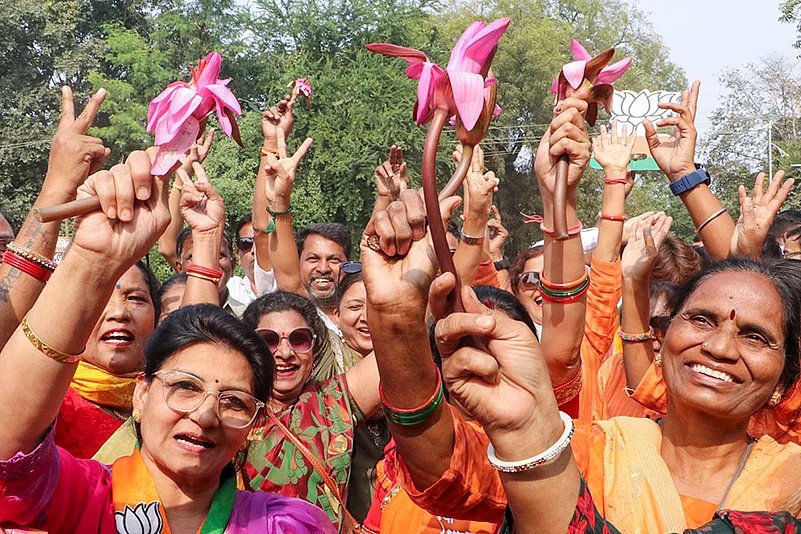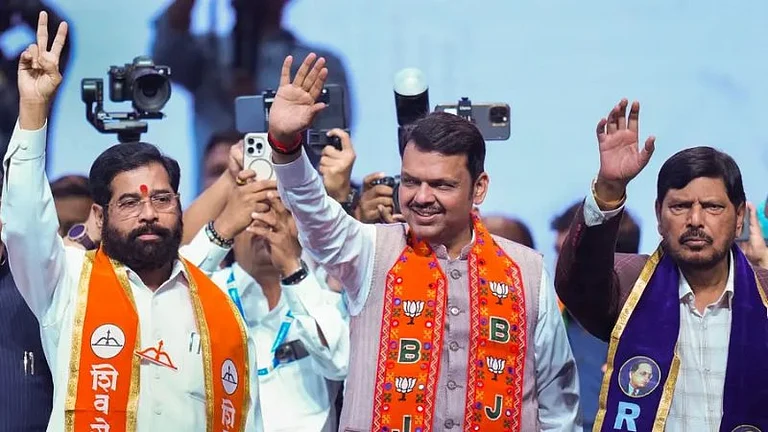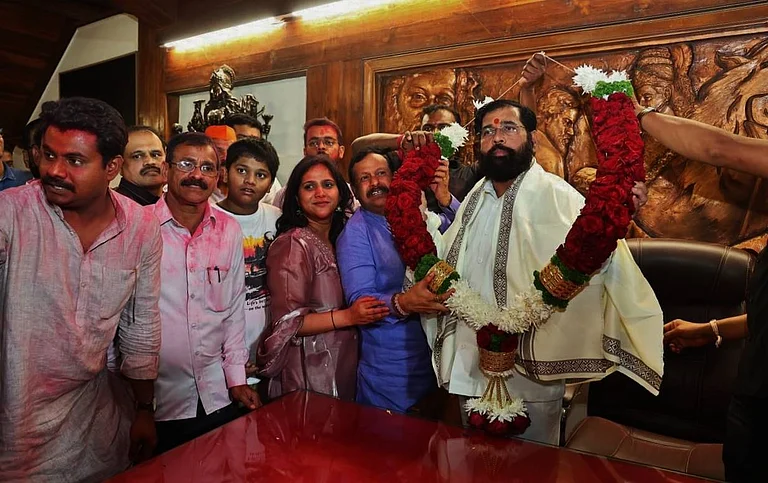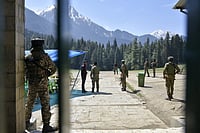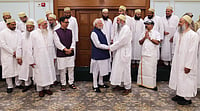The ‘beloved sisters’ of Maharashtra appear to have trumped Chief Minister Eknath Shinde in clinching the victory title in the assembly elections
Shinde, who led the campaign of the Mahayuti alliance -- including the Bharatiya Janata Party, Shiv Sena and the Nationalist Congress Party -- praised the sisterly female voters for the thumping majority. “Mahayuti has emerged as the favourite in Maharashtra. This victory belongs to my beloved sisters,” said Shinde in a tweet thanking the people of Maharashtra.
Within the Mahayuti, the BJP made a clean sweep with an estimated win in 130 seats, followed by Shiv Sena (57) and NCP (41).
Mahayuti’s unprecedented winning margin against the rival Mahavikas alliance --Congress, Shiv Sena (UBT), NCP (Sharad Pawar)--has not just come as a surprise for Maharashtra, but to the ruling alliance itself.
“In the poll predictions until yesterday evening, we three were nowhere in the race. We thought we might be trailing behind,” Ajit Pawar, deputy chief minister and NCP leader, said in the post-result media interaction, alongside Shinde and BJP deputy chief minister Devendra Fadnavis.
By Mahayuti’s estimate, the alliance was expected to win around 170 out of 288 seats. However, the success in 229 seats was unanticipated, Pawar said. “The Ladki Bahin scheme was the game-changer. The sisters showed such a powerful current that all others fell flat in front of them,” Pawar said in a lighter vein.
He attributed the victory to the “millions of workers and government officials who worked constantly to ensure government schemes like ‘Ladki Bahin’ reach the beneficiaries.”
Alongside Shinde, Pawar is another winning hand in the Mahayuti alliance. Leaving behind the dismal performance in the Lok Sabha elections, where his faction managed to win just one seat, Pawar has made a solid comeback, winning close to 41 seats out of the 51 his party contested.
As per poll analysts, women voters have played a decisive role in swinging the votes in Mahayuti’s favour. Maharashtra witnessed a high voter turnout of 65.22 per cent, as against 61.6 per cent in 2019. The CM Ladki Bahin Yojana (beloved sister scheme) which provides a monthly allowance of Rs 1500 to marginalised women, is among the major factors in boosting the female voter turnout.
Kolhapur-based political expert, Ashok Chausalkar says the women's welfare scheme encouraged female voters to come out and cast their votes. “Female voters have contributed to the surge in voter turnout by four per cent.”
Shinde credited the popularity of welfare schemes like Ladki Bahin Yojana and Shashan Aaplya Daari (government at your door) executed in the 2.5 years of his government in pulling maximum votes for the alliance.
“We have worked for the poor people. This government is of the people,” he said in a media interaction outside his official residence, Varsha.
The landslide victory of the Mahayuti alliance has given Shinde a clear edge as a mass leader. He has successfully cleared the blot of ‘rebel’ and ‘traitor,’ linked to his name after he split with Uddhav Thackeray, led Shiv Sena and joined the BJP in 2022, analysts say.
“Shinde has firmly shut down the UBT Sena’s discourse on being a ‘gaddar’. Moreover, people are no longer interested in this type of negative campaigning against an individual leader, they want results,” says Hemant Desai, Mumbai-based political expert on Shiv Sena. With his high-scoring performance in the Lok Sabha and the assembly elections, Shinde has proved he is the real leader of the Shiv Sena, Desai adds. “The mandate is clear in people’s court over which Shiv Sena they prefer.”
Earlier, Shinde held strong dominance over Mumbai’s neighbouring cities of Thane, Kalyan and Dombivali. But after becoming the leader of Sena, he has established his legitimacy as a strong pan-Maharashtra leader. His administrative workstyle, politics with welfare schemes and accessibility to the common man have made him an acceptable leader, experts say.
Chausalkar says the assembly results although surprising, reflect that all three parties in the Mahayuti alliance made major course corrections, following the Lok Sabha performance where MVA was in the lead. “The Mahayuti put up a united front and fought the elections on the development agenda. Whereas, the MVA parties fought on an individual front.”
The MVA parties also failed to set a common election agenda. Their negative campaigning against the Mahayuti candidates and the government schemes backfired in a major way. After criticising the Ladki Bahin Yojana, as an additional expenditure on the cash-strapped government, the MVA in its manifesto announced a similar scheme called Mahalaxmi, promising a hike of Rs 3000 per month to women from marginalised families.
MVA’s rallying on caste identity politics between Marathas and OBC, and demand for caste census, resulted in further division and unreset among these communities. “It led to counter-mobilisation of OBC votes and ultimately benefited the BJP,” Chausalkar says.
The results of this fragmentation are particularly seen in the Marathwada and Western Maharashtra region, where the BJP recorded a massive stride after failing to make its mark in the Lok Sabha elections. The BJP faced hostility in the Marathwada region, ailing from agrarian crisis and the Maratha quota agitation, and in Western Maharashtra, known as a stronghold of NCP’s Sharad Pawar.
Lastly, the consolidation of Muslim votes in MVA’s favour and the BJP’s communal narrative of Vote Jihad, Ek hai to safe hai, proved advantageous for the ruling alliance, according to Chausalkar.
The reversal of Lok Sabha's gains and the humiliating defeat in the assembly polls have put the MVA alliance parties in a quandary. The defeat of Congress’s stalwarts like Balsaheb Thorat, Prithviraj Chauhan and Nana Patole has been a major setback for the party.
Desai says Congress’s embarrassing performance is the worst in Maharashtra’s history. “A national party of Congress’s stature could not even win 20 seats. Its performance is so pathetic that it does not even qualify for the status of opposition leader.”
In the face of the BJP and its allies' stunning performance, the opposition faces an insurmountable challenge of re-establishing its political existence.
However, in the next few days, all eyes will be glued to the announcement of the Chief Minister’s name. The BJP is likely to keep the CM post based on the number of wins scored. Speculations are rife that Fadnavis will once again be named as the CM.
However, Desai feels, that Shinde is unlikely to let go of his powerful chair without putting up a tough fight. “Shinde’s political ambitions have increased with the assembly results. Without the CM post, he will lose his position of authority within Sena. The BJP and Fadnavis remain main challenge for Sena and Shinde’s supremacy within the alliance.”






